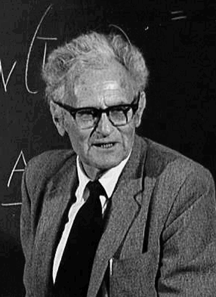 1893-1976
1893-1976
Max Kleiber was born and educated in Zurich, Switzerland. He graduated from the Federal Institute of Technology as an Agricultural Chemist in 1920, earned the ScD degree in 1924, and became a private dozent after publishing his thesis "The Energy Concept in the Science of Nutrition".
He came to the Animal Husbandry Department of UC Davis in 1929 to construct respiration chambers and conduct research on energy metabolism in animals. Among his many important achievements, two are especially noteworthy. In 1932 he came to the conclusion that the 3/4 power of body weight was the most reliable basis for predicting the basal metabolic rate of animals and for comparing nutrient requirements among animals of different size. He also provided the basis for the conclusion that total efficiency of energy utilization is independent of body size. These concepts and several others fundamental for understanding energy metabolism are discussed in Kleiber's book, The Fire of Life published in 1961 and subsequently translated into German, Polish, Spanish, and Japanese.
Max Kleiber pioneered the use of biologically important isotopes to study metabolic processes in the intact animal. He chose the dairy cow for these studies because of its agricultural importance and its unique experimental advantages as a lactating animal. Students and other scientists from around the world were attracted to Davis to do research with Kleiber's "tracer team".
His research resulted in more than two hundred scientific publications and earned him worldwide recognition as a leader in animal nutrition and metabolism. Some of his most prestigious honors include the "Borden Award" from the American Institute of Nutrition in 1952, the "Morrison Award" from the American Society for Animal Production in 1953, a Guggenheim Fellowship in 1954, and the honorary LLD degree from the University of California in 1962. He was a Fellow of the American Institute of Nutrition, a Fellow of the American Association of Veterinary Medicine, and was elected to several honorary societies. Max was an outstanding teacher popular with undergraduates and graduate students alike. He continued teaching - lecturing to students here and elsewhere throught the world, maintained an active correspondence with fellow scientists, and contributed to scientific journals after his official retirement. In 1971 a new classroom building was named Kleiber Hall in his honor.
